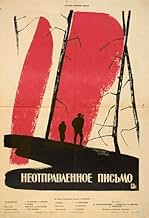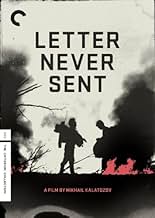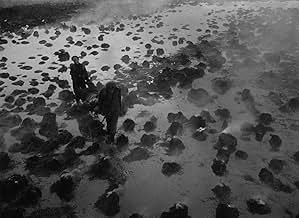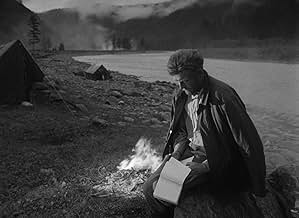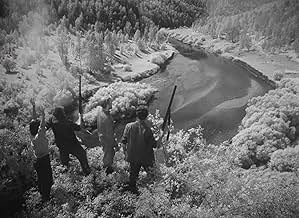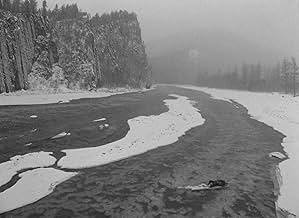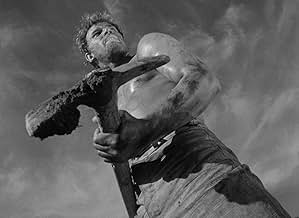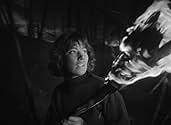IMDb-BEWERTUNG
7,8/10
4639
IHRE BEWERTUNG
Vier Geologen suchen in der Wildnis Sibiriens nach Diamanten.Vier Geologen suchen in der Wildnis Sibiriens nach Diamanten.Vier Geologen suchen in der Wildnis Sibiriens nach Diamanten.
- Auszeichnungen
- 1 Nominierung insgesamt
Innokentiy Smoktunovskiy
- Konstantin Sabinin
- (as I. Smoktunovskiy)
Tatyana Samoylova
- Tanya
- (as T. Samoylova)
Vasiliy Livanov
- Andrey
- (as V. Livanov)
Evgeniy Urbanskiy
- Sergey Stepanovich
- (as Ye. Urbanskiy)
Galina Kozhakina
- Vera
- (as G. Kozhakina)
Empfohlene Bewertungen
Stunning cinematography in the Siberian taiga is the highlight here, with scenes like the dramatic/scary forest fire and ice floe accentuated by artistic camera work, including some nifty handheld shots. It's a survival story, one in which a quartet of explorers go out into the rugged wilderness in the hopes of finding diamonds to help the technological advancement of the Soviet state, but find themselves imperiled by the merciless forces of nature. Director Mikhail Kalatozov and cinematographer Sergey Urusevsky made a beautiful film here, one that for the visuals alone made it well worth seeing.
Where the film fell a little short for me was in how forced a couple of its aspects were. The first was the romantic angles, with Tatiana Samoilova and Vasily Livanov playing the two geologists on the mission who are also in love. While that could have added depth to the story and I would watch Samoilova in pretty much anything, the dialogue seemed so inauthentic that it pulled me out of feeling any kind of emotion for the two, or the tension of jealousy from a third man, played by Yevgeni Urbansky. I felt the same way about the titular framing for the story, a letter being composed by the guide (Innokenty Smoktunovsky).
The second aspect that took away from the experience was how heavy-handed the allegory was, with the clear message of perseverance, courage, and sacrifice for the greater good of the Fatherland. This was a story that needed gritty realism in every respect; we get it from the natural elements, but not always with the people, which was unfortunate. Had it been otherwise, this would have been a masterpiece.
Where the film fell a little short for me was in how forced a couple of its aspects were. The first was the romantic angles, with Tatiana Samoilova and Vasily Livanov playing the two geologists on the mission who are also in love. While that could have added depth to the story and I would watch Samoilova in pretty much anything, the dialogue seemed so inauthentic that it pulled me out of feeling any kind of emotion for the two, or the tension of jealousy from a third man, played by Yevgeni Urbansky. I felt the same way about the titular framing for the story, a letter being composed by the guide (Innokenty Smoktunovsky).
The second aspect that took away from the experience was how heavy-handed the allegory was, with the clear message of perseverance, courage, and sacrifice for the greater good of the Fatherland. This was a story that needed gritty realism in every respect; we get it from the natural elements, but not always with the people, which was unfortunate. Had it been otherwise, this would have been a masterpiece.
Loss, purpose, and redemption, all in this harrowing adventure and visual tour-de-force by usual suspects Kalatozov/ Urusevsky.
An expedition of diamond hunters is dropped in the Siberian plateau with the mission of discovering a rumoured diamond vein. In the course of the movie diamonds acquire a further symbolic aspect as the purpose in life. As the expedition is befallen by a raging fire and forced to make a hazardous escape through burning logs, saving the map which points to the location of the much sought-after diamonds becomes a struggle to preserve purpose and meaning in a world that defies it. As the surviving members of the expedition stagger through the charred landscape, amidst billows of smoke and torrents of rain, nothing there to answer their pleas and curses but the echo of their voices, the world seems indifferent to their plight.
The star of the movie however is Urusevsky's cinematography. Kalatozov fails to harness his tremendous visual talent as he did in THE CRANES ARE FLYING, certain scenes flailing for attention but lacking the dramatic pull to justify them, but still someone who likes movies for their pictorial quality, for the endless possibilities of capturing images with a photographic lens and moving inside a thridimensional canvas; such a person will be left in awe and admiration of what Urusevsky achieves. His rapid tracking shots through branches of trees, as though the nature conspires to ensnare the protagonists, the amazing clarity of the closeups, the maize of hand-held shots thrusting the viewer right there in the middle of the action, the beautiful dutch angles transforming the geography of the landscape into something that can only exist for and by the camera.
Although the plot has its heart in the right place, much like its predecessor, it suffers from being too overwrought and from lapsing into moments of melodrama. Plot threads that are emphasized early on, like Sergei's unrequisite love and the growing tension with Tanya, are never really resolved and come to a screeching halt when the fire erupts. Traditional Soviet values, like the leader's dream of a Diamond City and the portrayal of civilization as a collective good, don't chime with my sensibilities. The score is often jarring and obtrusive but that's 50's cinema for you.
Overall this is a visually marvellous film aimed at the cinephiles who can appreciate such things.
An expedition of diamond hunters is dropped in the Siberian plateau with the mission of discovering a rumoured diamond vein. In the course of the movie diamonds acquire a further symbolic aspect as the purpose in life. As the expedition is befallen by a raging fire and forced to make a hazardous escape through burning logs, saving the map which points to the location of the much sought-after diamonds becomes a struggle to preserve purpose and meaning in a world that defies it. As the surviving members of the expedition stagger through the charred landscape, amidst billows of smoke and torrents of rain, nothing there to answer their pleas and curses but the echo of their voices, the world seems indifferent to their plight.
The star of the movie however is Urusevsky's cinematography. Kalatozov fails to harness his tremendous visual talent as he did in THE CRANES ARE FLYING, certain scenes flailing for attention but lacking the dramatic pull to justify them, but still someone who likes movies for their pictorial quality, for the endless possibilities of capturing images with a photographic lens and moving inside a thridimensional canvas; such a person will be left in awe and admiration of what Urusevsky achieves. His rapid tracking shots through branches of trees, as though the nature conspires to ensnare the protagonists, the amazing clarity of the closeups, the maize of hand-held shots thrusting the viewer right there in the middle of the action, the beautiful dutch angles transforming the geography of the landscape into something that can only exist for and by the camera.
Although the plot has its heart in the right place, much like its predecessor, it suffers from being too overwrought and from lapsing into moments of melodrama. Plot threads that are emphasized early on, like Sergei's unrequisite love and the growing tension with Tanya, are never really resolved and come to a screeching halt when the fire erupts. Traditional Soviet values, like the leader's dream of a Diamond City and the portrayal of civilization as a collective good, don't chime with my sensibilities. The score is often jarring and obtrusive but that's 50's cinema for you.
Overall this is a visually marvellous film aimed at the cinephiles who can appreciate such things.
The fate of the film otherwise, as difficult, can not be called. The film was nominated for the Palm d'Or of the Cannes Film Festival in 1960 and was scheduled to be shown on May 17th. However, literally on the eve of presentation the application for the film in the competition program of the film festival was withdrawn. Although, as we all know, all countries, all film companies and all directors, not to mention actors, are passionately interested in participating in international film festivals. Moreover, such prestigious as Cannes.
There are two versions of the explanation of the reasons for such an emergency withdrawal of the application. According to the official, the director of the film, Mikhail Kalatozov, suddenly wanted to fix something in the film, so that by the premiere in the USSR, scheduled for June 27, the film would not have a single flaw. According to the second, unofficial version, the application was withdrawn by the leaders of the USSR State Committee for Cinematography, who suddenly realized that the film shows how the means for socialist industrialization (in the film - diamonds) are sought at the cost of human lives (in the film - of geologists).
For me personally, the second version seems to be more plausible. And that's why. The film is brilliant! Filmed by director Kalatozov and cameraman Sergei Urusevsky, both are triumphants of the Cannes Film Festival in 1958 for the film "The Cranes Are Flying." Top actors of the then Soviet cinema play in the film: Innokenty Smoktunovsky, Yevgeny Urbansky and incomparable Tatyana Samoilova. The high class of the picture also underlines the fact that literally the next year the film was released on European screens, and a year later - on the screens of US cinemas. But I don't remember whether this film was shown in the USSR in the 1960s - 1970s.
However, human memory is an unreliable tool. Therefore, I turned to Kinopoisk for information on the number of viewers who watched this film in its first year. No such information! About the films that were released on the screens in the same years, for example, "The Ballad of a Soldier," there is such data. About earlier films, for example, "The Cranes Are Flying" or "True Friends", etc., there is such information. And about the "Letter Never Sent" - no! What can it say? Either the film was taken off the screen immediately after the premiere, or released in such a limited number of copies that it cites data on the viewing of a Soviet film in the Soviet Union by the number of viewers smaller than, say, in France, to put it mildly, uncomfortable. This is why data is absent.
And no more any nomination for any film festival. Although it would seem that the premiere took place, it means that the director eliminated all the flaws. Why not to nominate? Especially since Tatyana Samoilova, after "The Cranes Are Flying," was in world cinema a star of the first brightness.
After the premiere of this film in New York, The New York Times responded - a rare case! - quite a benevolent review, however, without attribution. So, we can assume that this review reflects the opinion of the entire editorial board of the newspaper. Of course, a significant part of the review was dedicated to our great Actress Tatyana Samoilova. But the film itself was addressed very flattering epithets: "FOR sheer photographic pull and intensity, "The Letter That Was Never Sent" is unlike any other Russian film drama in many years, ...a truly rare movie, stark in content and setting, pretentious and obscure at times, but of a marvelous pictorial texture. See this unorthodox Russian movie, hold on (like the determined cast) and we guarantee it will get you."
And therefore it is not at all surprising that Francis Ford Coppola in 1995 funded the restoration and re-rental of this painting in the United States. Perhaps this is due to the fact that of all countries, this film has the highest rating in the United States. Overall, 64% of IMDB and Kinopoisk users around the world gave this film a rating of 8 to 10.
Based on the foregoing, the rating of the film according to the FilmGourmand's version is 7.826. And this low rating is due primarily to the fact that the Soviet leadership at one time prevented the participation of the film in any film festivals and narrowed the scope of the film to the maximum extent possible in cinemas. But, nevertheless, the film is included in the FilmGourmand's Golden Thousand with Rank 947.
This robust survival adventure follows a team of Soviet geologists stranded in the wilderness of Siberia after a forest fire severs their communication link with civilization. The opening dedication to Socialist heroes everywhere and the noble sacrifices made by each character carry the story dangerously close to propaganda, but the intensity of their ordeal (through smoke and fire, over snow and ice, across mountains and tundra) thankfully overwhelms the political simplicity of the script. Unfortunately, it also overwhelms the initial hints of tension between each of the four characters (three male, one female) after the struggle to survive becomes paramount. The sense of isolation and exposure is numbing; the film was directed with a strong sense of visual drama (including more than one knockout montage), showing everything an audience would ever want to know about being lost in Siberia.
In Mikhail Kalatozov's Letter Never Sent, four geologists are searching for diamonds in the wilderness of Siberia. Three men, one woman. Andrei and Tanya are in love. Sergei is in love with Tanya. Sergei is a strong man who had been on such expeditions but had returned with no luck. He is jealous of the nerdy Andrei's and the beautiful Tanya's relationship but never cares to hide that feeling. Sabinine (The Leader of the expedition) often spends his free time writing letters, which he will never send, to the woman he once loved. This is how the film begins: By presenting a set of characters, each having different perspectives but are present in the wild forests of Siberia for one reason. With the hope of serving their country, they are present there hunting for a diamond vein. It's no surprise that the diamond deposit is discovered in the film after days of hard work. Previous expeditions had failed but this one expedition proved that there indeed was a diamond deposit in Siberia. Soon, the four geologists, filled with zeal and satisfaction, find themselves engulfed by a huge forest fire and completely cut of from the civilized world. Will they survive?
Before the opening credits, the film pays tribute to the people of the Soviet Union who have given their lives for the benefit of the country, whether it be astronauts seeking answers for the mysteries of space or geologists going in to the wilderness hunting for diamonds. Throughout the entire film, we see the characters suffering in the piercing cold and bleak atmosphere of Siberia. Their goal at this point is to safely deliver the map, on which the whereabouts of the diamond deposit is marked, to Moscow. We see sacrifice. We witness loss. We witness alienation, hunger, despair. This is where I realized that similar to numerous Soviet films, Letter Never Sent contains shards of Propaganda. Adventure? Nope. I look at this one as a miserable survival film filled with some unnecessary moments of melodrama, patriotism and hyperactivity. The fact is that I don't mind patriotism and propaganda. But in this case it's overdone. I just didn't care for any of the characters. Not even the gorgeous Tatiana Somailova whose performance in the 1957 Soviet Classic The Cranes are Flying (Also directed by Mikhail Kalatozov) was spellbinding. It was because of this film that I was intrigued to check out Letter Never Sent.
Now the big question: What relation does the film and it's title have? As stated earlier, Sabinine wrote letters to a woman he loved from his past. He wrote them, feeling nostalgic, without the intention of sending them (Of course, the team is already in the middle of nowhere). This relation is explained further in the final moments of the film but it's significance is again directed more towards patriotism, in my opinion. Another disappointing aspect.
Unlike the ingenious masterpiece The Cranes are Flying, this film lacks true emotions. I went in with high hopes of seeing another Soviet masterpiece but eventually I was left disappointed. Albeit this film failed to emotionally engross me, Sergei Urusevsky's miraculous cinematography makes the film worth watching. Urusevsky and Kalatozov have collaborated in multiple films and their most well known work is of course The Cranes are Flying, where the film used astonishing camera- work. Though I believe Letter Never Sent takes it to a whole new level by composing unbelievable images. The camera work is well ahead of it's time. It looked like that the camera glided through the wild fire and the horrible blizzards very smoothly. The technical artistry of this film deserves a standing ovation and at times it completely overpowers the dissatisfying screenplay.
On the positive side, Letter Never Sent is one of the strongest proofs of how visually powerful cinema can be. If you ever tell me to compile a top 10 list of the most visually stunning films ever crafted, this one will gladly make it to the top 5. Mr. Urusevsky, you rock. (And I will highly recommend The Cranes are Flying in case you haven't seen it yet).
filmsmostbeautifulart.blogspot.in
Before the opening credits, the film pays tribute to the people of the Soviet Union who have given their lives for the benefit of the country, whether it be astronauts seeking answers for the mysteries of space or geologists going in to the wilderness hunting for diamonds. Throughout the entire film, we see the characters suffering in the piercing cold and bleak atmosphere of Siberia. Their goal at this point is to safely deliver the map, on which the whereabouts of the diamond deposit is marked, to Moscow. We see sacrifice. We witness loss. We witness alienation, hunger, despair. This is where I realized that similar to numerous Soviet films, Letter Never Sent contains shards of Propaganda. Adventure? Nope. I look at this one as a miserable survival film filled with some unnecessary moments of melodrama, patriotism and hyperactivity. The fact is that I don't mind patriotism and propaganda. But in this case it's overdone. I just didn't care for any of the characters. Not even the gorgeous Tatiana Somailova whose performance in the 1957 Soviet Classic The Cranes are Flying (Also directed by Mikhail Kalatozov) was spellbinding. It was because of this film that I was intrigued to check out Letter Never Sent.
Now the big question: What relation does the film and it's title have? As stated earlier, Sabinine wrote letters to a woman he loved from his past. He wrote them, feeling nostalgic, without the intention of sending them (Of course, the team is already in the middle of nowhere). This relation is explained further in the final moments of the film but it's significance is again directed more towards patriotism, in my opinion. Another disappointing aspect.
Unlike the ingenious masterpiece The Cranes are Flying, this film lacks true emotions. I went in with high hopes of seeing another Soviet masterpiece but eventually I was left disappointed. Albeit this film failed to emotionally engross me, Sergei Urusevsky's miraculous cinematography makes the film worth watching. Urusevsky and Kalatozov have collaborated in multiple films and their most well known work is of course The Cranes are Flying, where the film used astonishing camera- work. Though I believe Letter Never Sent takes it to a whole new level by composing unbelievable images. The camera work is well ahead of it's time. It looked like that the camera glided through the wild fire and the horrible blizzards very smoothly. The technical artistry of this film deserves a standing ovation and at times it completely overpowers the dissatisfying screenplay.
On the positive side, Letter Never Sent is one of the strongest proofs of how visually powerful cinema can be. If you ever tell me to compile a top 10 list of the most visually stunning films ever crafted, this one will gladly make it to the top 5. Mr. Urusevsky, you rock. (And I will highly recommend The Cranes are Flying in case you haven't seen it yet).
filmsmostbeautifulart.blogspot.in
Wusstest du schon
- WissenswertesIn 1995 the film was restored by and shown in United States upon the financial support from Francis Coppola.
- Zitate
Andrey: Sergei, you've fallen in love with a girl who loves someone else, and that man loves her. From the moral standpoint it's wrong.
Sergey Stepanovich: I don't give a damn about your bookish morale. I'm in love.
Andrey: That's an egoist speaking.
- VerbindungenFeatured in Fejezetek a film történetéböl: A szovjet film 1953-1970 (1990)
Top-Auswahl
Melde dich zum Bewerten an und greife auf die Watchlist für personalisierte Empfehlungen zu.
- How long is Letter Never Sent?Powered by Alexa
Details
- Erscheinungsdatum
- Herkunftsland
- Offizieller Standort
- Sprache
- Auch bekannt als
- Letter Never Sent
- Drehorte
- Produktionsfirma
- Weitere beteiligte Unternehmen bei IMDbPro anzeigen
- Laufzeit1 Stunde 36 Minuten
- Farbe
- Sound-Mix
- Seitenverhältnis
- 1.37 : 1
Zu dieser Seite beitragen
Bearbeitung vorschlagen oder fehlenden Inhalt hinzufügen

Oberste Lücke
By what name was Ein Brief, der nicht abging (1960) officially released in India in English?
Antwort
